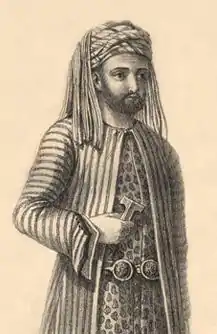Agha (title)
Agha (Turkish: ağa;[2] Ottoman Turkish: آغا; Persian: آقا, romanized: āghā; "chief, master, lord"[3]) is an honorific title for a civilian or officer, or often part of such title. In the Ottoman times, some court functionaries and leaders of organizations like bazaar or the janissary units were entitled to the agha title. In rural communities, this term is used for people who own considerable lands and are influential in their community. Regardless of a rural community, this title is also used for any male that is influential or respected.[2]
Etymology
The word agha entered English from Turkish,[3] and the Turkish word comes from the Old Turkic aqa, meaning "elder brother".[4] It is an equivalent of Mongolian word aqa or aka.[5]
Other uses
"Agha" is nowadays used as a common Persian honorific title for men, the equivalent of "mister" in English.[6] The corresponding honorific term for women is khanum.
References
- Narrative of Residence in Koordistan and on the Site of Ancient Nineveh, pages 66 and 214, Claudius James Rich, Published 1836, J. Duncan, 860 pages
- "ağa". Türk Dil Kurumu Sözlükleri. Retrieved 10 July 2022.
- "Online Etymology Dictionary". Etymonline.com. Retrieved 2017-06-30.
- Turkish. "Aga | Define Aga at Dictionary.com". Dictionary.reference.com. Retrieved 2017-06-30.
- "*Etimoloji: Kökenbilim, kelimelerin aslını ve evrimini inceleyen disiplin ~ EYun étymon "asıl" + logeía "bilim"". Nisanyansozluk.com. Retrieved 2017-06-30.
- Khani, S., and R. Yousefi. "The study of address terms and their translation from Persian to English." (2014).

